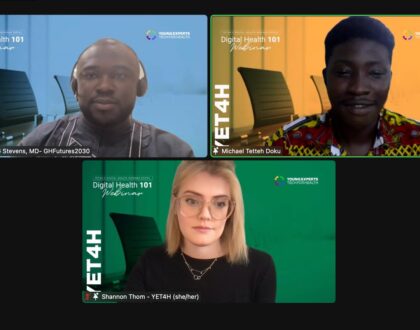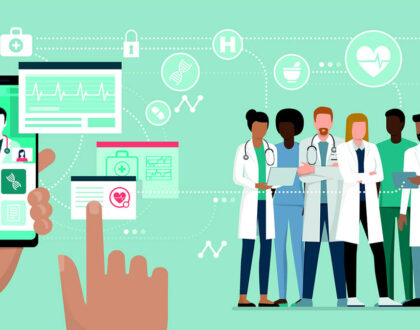‘MAKING DIGITAL TOOLS WORK FOR YOUNG PEOPLE’S HEALTH AND RIGHTS’ – 3 KEY TAKEAWAYS
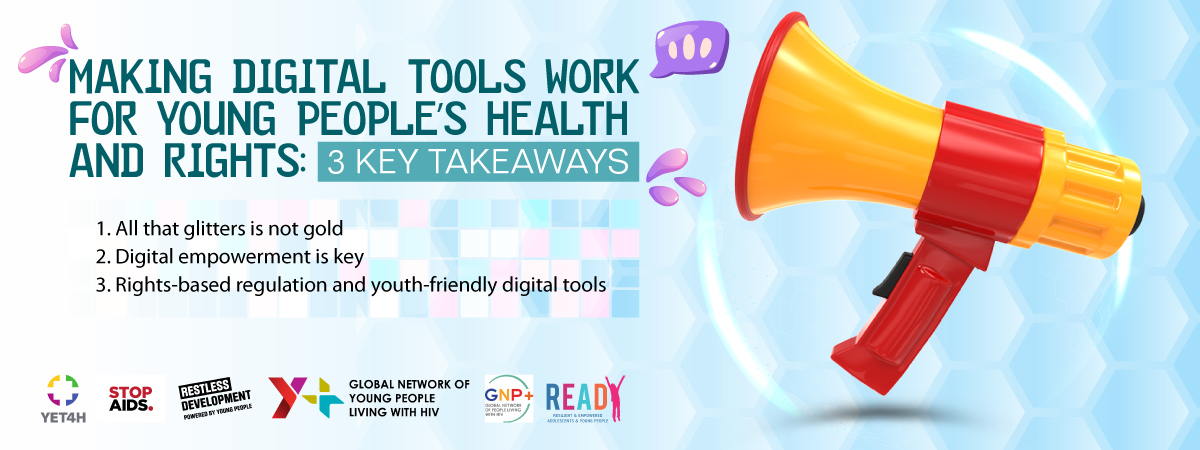
Digital health technologies offer many opportunities, but young people are concerned about where it can go wrong; when data is misused, when communities are left behind in the ‘digital divide’ and when policies do not exist to protect their rights.
In a recent online workshop, over 120 people from 47 countries stressed the importance of empowering young people in order to make digital tools work for their needs. Young people want to build their knowledge base on the issue, be upskilled to develop their own digital solutions and have a say in related policy-making.
The webinar, hosted by STOPAIDS, Restless Development,GNP+ (Global Network of People living with HIV) Young Experts: Tech 4 Health, READY and Y+ Global (Global Network of Young People living with HIV) called “Making digital tools work for young people’s health and rights” aimed to improve young people’s knowledge about their digital rights and mobilize young people to take action.
The Call To Action From Young People.
Many issues and questions were raised by young people, but 3 key messages came through strongly through polls and group discussions:
- All that glitters is not gold. Young people raised concerns about data misuse and the digital divide.
Young people acknowledge that digital technologies can improve their access to health information and services. However, they don’t feel safe online and expressed worry about the misuse of data by governments or for commercial interests as well as the lack of regulations to ensure their safety and data privacy online.
Carolyne Njoroge, a young person from the Kenya Sex Workers Alliance, shared these concerns in her story, which highlighted the very real threats that digital health technologies pose for the safety of marginalised communities.
She described there had been instances in Kenya when sensitive health information about sex workers or persons living with HIV/AIDS has been leaked, leading to minority groups receiving threats and, in some instances, physical abuse. The growing risks of misinformation and its links with spreading cyberviolence and racism were also highlighted by speaker Boyan Konstantinov from UNDP.
Young people also stressed the many diverse faces of the ‘digital divide’, showing concern for those who do not have good quality or any access to the internet and digital tools, especially women and those in rural areas, those who are left behind because many digital tools are predominantly created for the Global North, and those who cannot engage because of language or other access barriers, such as visual impairments.
Speaker Dr. Tlaleng Mofokeng, the UN Special Rapporteur on the right to physical and mental health, echoed the concerns with inequity, citing the high cost of internet data, the digital divide within and between countries, and the gender digital divide.
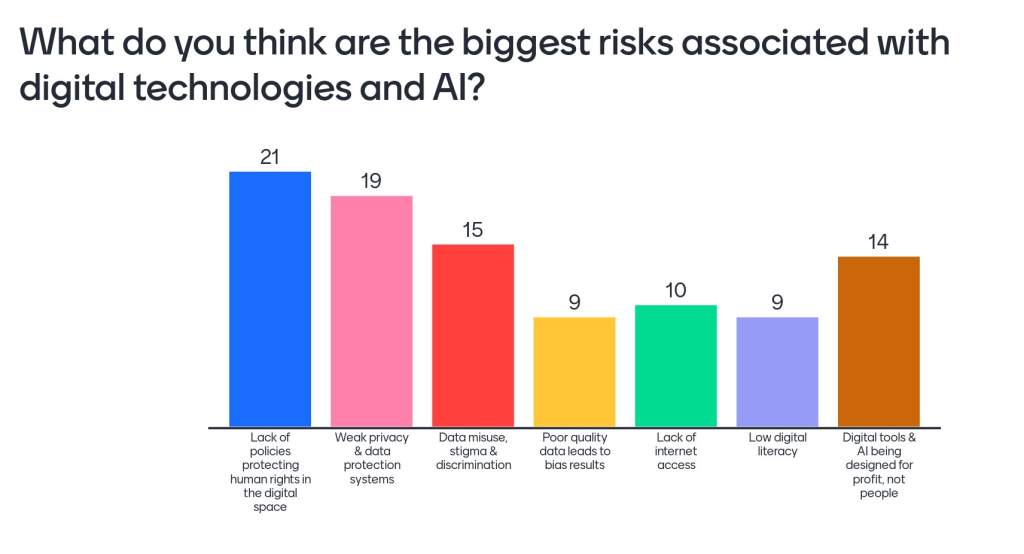
2. Young people’s digital empowerment is key and comes in many forms.
Improving young people’s knowledge about data, digital tools, AI and associated laws and policies is a critical foundation to make digital tools work for young people’s health and rights. Digital literacy enables young people to understand and manage the risks and impacts of digital tools.
When combined with other support and opportunities, young people can become co-creators in the design of new digital tools. Digital health stakeholders can also support young people’s understanding by using accessible language, especially when people are asked to agree to share their data.
To understand young people’s needs and empower them, you need to meaningfully engage them in the decision-making process. Young people don’t feel engaged, and even when consulted, they see the process as superficial with a lack of respect for their time and expertise. They want to see real investment and commitment from digital stakeholders to meaningful youth engagement principles.
Responding to these challenges, Kate Pundyk (Young Experts: Tech 4 Health) challenged policy-makers to do better for young people and called on young people to hold leaders accountable for their digital health rights.
“Ask questions not only for understanding but to make your voices stand out…if something feels wrong about technology and you don’t feel safe and protected, seek answers from your leaders and hold them accountable” Kate Pundyk
3. A shift towards rights-based regulation and youth-focused digital tools
Young people want to see proactive measures, including policies and laws, to protect and safeguard their health data and rights within the digital space. This may include, for example, frameworks to assess the efficacy, effectiveness, safety, privacy and equity of digital tools.
Having gained experience in fighting to protect minority groups online, Carolyne Njoroge called for stronger regulations, which must be developed and implemented through a multi-stakeholder approach and not only vested in the hands of governments.
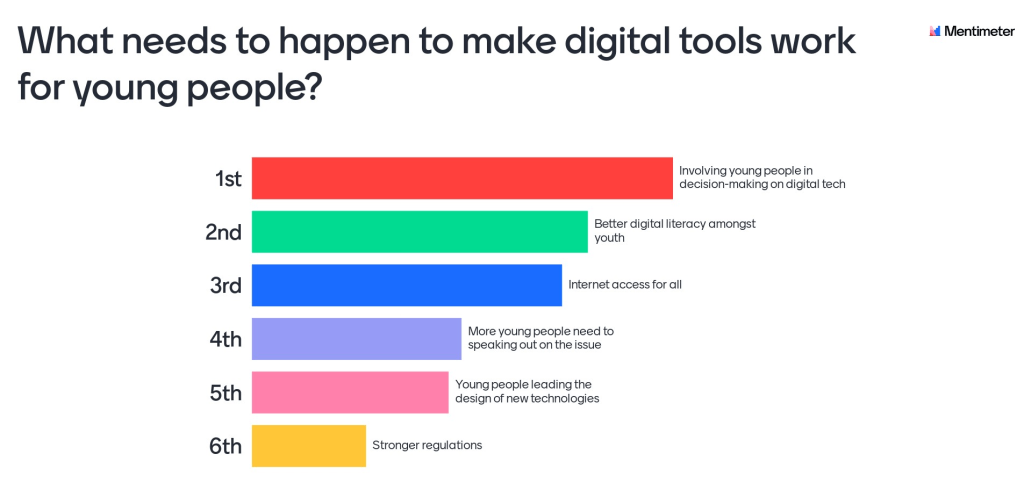
There are many areas that digital technologies may help us to progress in – equal access to services and better mental health, to name a couple – but not without youth at the forefront.
Authors
Richard Dzikunu (Young Experts:Tech4Health) and Tabitha Ha (STOPAIDS).
With thanks to STOPAIDS, Young Experts: Tech4Health, Restless Development, GNP+ (Global Network of People living with HIV), Y+ Global (Global Network of Young People living with HIV) and READY Movement for co-organising this event.
With particular thanks to co-moderators, Tinashe Rufurwadzo (Y+ Global), Jimena Cascante-Matamoros (Restless Development), speakers, Carolyne Njoroge (Kenya Sex Workers Alliance), Dr Tlaleng Mofokeng (UN HRC Special Rapporteur on the right to health), Kate Pundyk (Youth Experts:Tech4Health) and Boyan Konstantinov (UNDP) as well as breakout group rapporteurs, Thuy Duyen Chau and Jake Atkinson, for reviewing this blog.
Recommended Posts
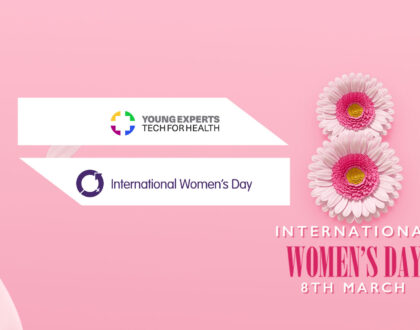
YET4H marks International Women’s day
March 29, 2023

